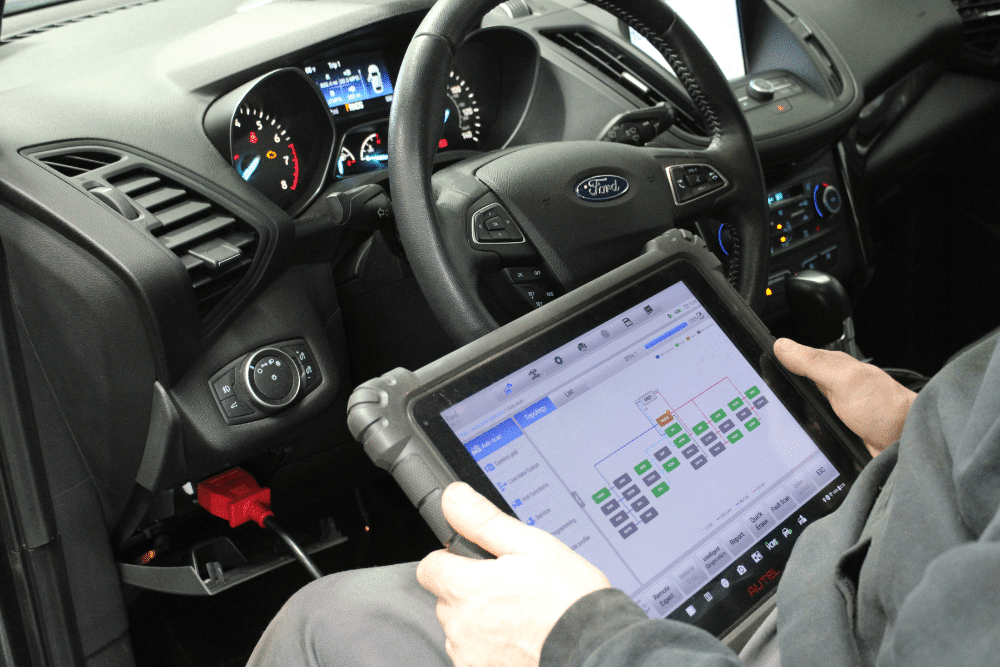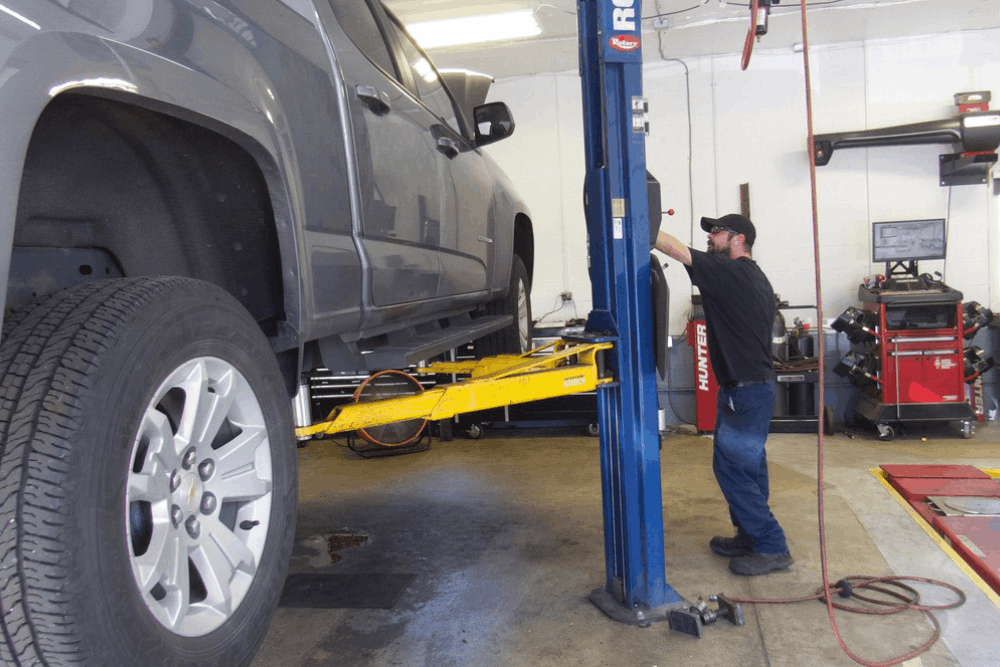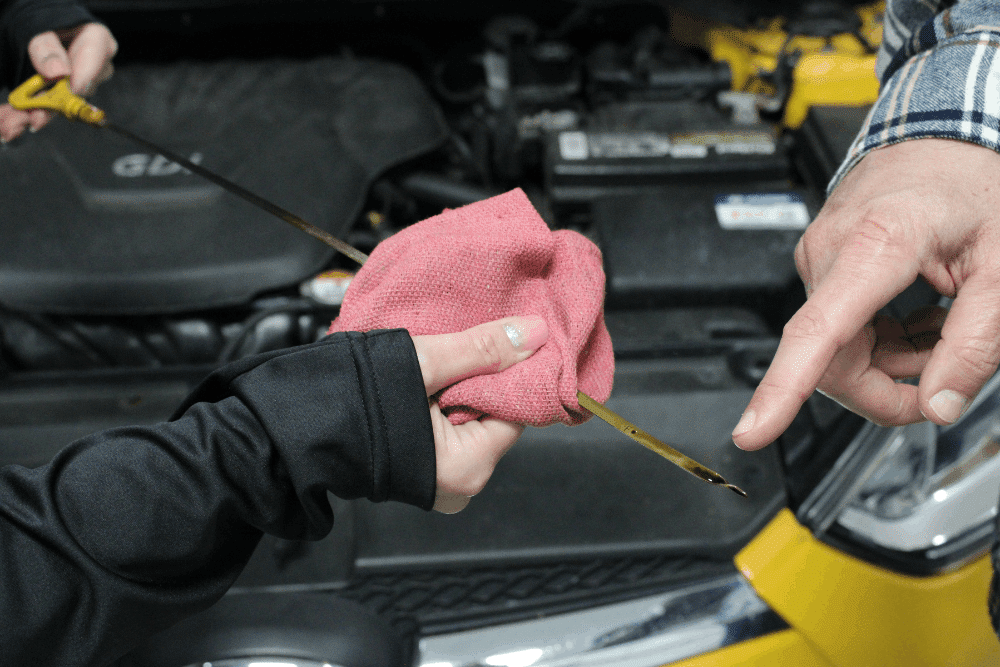Every odd noise or dashboard light tells a story, if you know how to listen. At Allied Automotive in Allentown, PA, our advanced diagnostic process helps uncover what your vehicle can’t say out loud. From subtle performance shifts to full-blown warning lights, we translate your car’s internal signals into clear answers you can trust.
Wondering what happens behind the scenes when your car starts acting up? This guide breaks it all down, so you’ll know what to expect and why it matters.
Smart Repairs Start with Diagnostics
Vehicle diagnostics aren’t just about turning off a warning light. They’re about uncovering issues that could impact your safety, performance, fuel efficiency, and long-term reliability.
Modern vehicles are equipped with an onboard computer known as the OBD (On-Board Diagnostics) system. It constantly monitors vital systems like engine performance, emissions, transmission, and fuel delivery. When something falls out of range, it stores a code and triggers a signal, often in the form of a check engine light.
A diagnostic service taps into that system, retrieves the data, and gives a trained technician what they need to start identifying the root cause. It’s a technical process, but also an investigative one. Skilled technicians use these codes as starting points, not conclusions.
What Issues Can Vehicle Diagnostics Reveal?
Diagnostic tools can detect and help pinpoint:
- Emissions system failures
- Ignition timing irregularities
- Fuel injector issues
- Transmission shifting problems
- Electrical faults and battery issues
- Sensor malfunctions (oxygen sensor, throttle position, etc.)
- Air conditioning and HVAC faults
- Hybrid and EV-specific concerns
The real value lies in early detection. Catching a minor issue now can prevent a much more expensive failure later. If your car feels “off,” your onboard computer likely already knows. It’s time to listen.
Check Engine Light On? Why You Shouldn’t Ignore It
Too many drivers ignore the check engine light, assuming it’s just a fluke or something they can deal with later. But here’s the truth: the light is never random. Even if it’s a simple fix, continuing to drive without addressing it can lead to further damage.
For example, a failed oxygen sensor might not affect how the vehicle drives initially, but it can quickly lead to:
- Reduced fuel efficiency
- Damage to the catalytic converter
- Emissions test failure
- Larger engine performance issues
When that light turns on, don’t wait. Schedule a vehicle diagnostics in Allentown as soon as possible to protect both your vehicle and your wallet.
Tools Technicians Use for Accurate Diagnostics
When it comes to vehicle diagnostics, relying solely on a scan tool is a common misconception. While it’s an important tool, it’s only one piece of the puzzle. Professional auto repair shops utilize a combination of advanced tools and techniques to accurately diagnose issues in today’s vehicles. These tools work together to uncover hidden problems and ensure the right solutions are applied, resulting in a smoother, safer ride. Here’s a breakdown of some key diagnostic tools used by technicians:
OEM-Level Diagnostic Scanners
OEM-level diagnostic scanners are indispensable for accurate vehicle diagnostics. These tools connect directly to the vehicle’s onboard computer system and provide access to factory-specific data that generic scanners cannot. With these scanners, technicians can read trouble codes, access live sensor data, perform system resets, and run advanced tests. This allows for a deeper understanding of the vehicle’s health, ensuring a precise diagnosis that can’t be achieved with off-the-shelf tools.
Lab Scopes and Electrical Testers
Diagnosing electrical issues in modern vehicles requires specialized equipment. Lab scopes and electrical testers allow technicians to thoroughly investigate complex electrical systems, which are increasingly common in newer vehicles. These tools can measure voltage, check signal patterns, and detect electrical faults that might otherwise go unnoticed. Given the sophistication of today’s vehicle wiring and sensor networks, these tools are essential for accurate diagnostics.
Smoke Machines (for Vacuum Leaks)
Smoke machines are used to detect hard-to-find leaks in a vehicle’s vacuum or intake system. The machine emits smoke into the system, and any leaks cause the smoke to escape, making them visible to the technician. These are particularly helpful for diagnosing problems with engine performance that may be caused by vacuum or exhaust leaks.
Digital Multimeters
Digital multimeters are versatile tools used to measure voltage, current, and resistance within electrical circuits. They’re essential for testing sensors, wiring, and relays, and are often used when diagnostics reveal electrical problems that need to be further explored. They help technicians identify faulty components and determine if a system is working as it should.
Compression Testers
Compression testers measure the pressure within an engine’s cylinders, helping to diagnose issues related to engine performance, such as poor acceleration or rough idling. This tool helps pinpoint problems like worn-out piston rings or valves, offering valuable insights into the engine’s internal health.
Can a Diagnostic Test Tell You Exactly What’s Wrong?
The short answer: not always.
A scan tool retrieves a diagnostic trouble code (DTC), which tells the technician where the problem exists, but not necessarily what caused it. For example, a P0301 code means a misfire in cylinder one, but that could be due to:
- A bad spark plug
- A faulty ignition coil
- A leaking injector
- Low compression
A skilled technician uses the code as a starting point, then tests components, monitors live data, and performs inspections to isolate the real issue.
This is why having diagnostics done at a trusted, experienced shop matters so much. Without a comprehensive process, you risk unnecessary parts replacements, incorrect repairs, and higher long-term costs.
Accuracy Matters: Why Choosing the Right Shop Makes a Difference
When it comes to diagnostics, accuracy is everything. A quick scan at a parts store might tell you what code is present, but not what’s wrong.
Shops that focus on high-volume repairs may rush the process, missing critical signs or selling unnecessary work. On the other hand, a shop that takes its time with testing, explanations, and education can save you money and stress down the road.
That kind of shop? You’ll find it right here in Allentown at Allied Automotive.
Dealer-Level Tools, Hometown Service: The Allied Difference
Allied Automotive has built a reputation for trust, transparency, and technical excellence since 2015. With a focus on domestic and Asian vehicles, their diagnostic process is thorough, modern, and customer-focused from start to finish.
Certified and Skilled Technicians
All diagnostics are handled by ASE-certified professionals who are trained in both standard and advanced systems, including hybrids, EVs, and light-duty diesel.
Equipment That Matches (or Exceeds) Dealerships
From OEM-compatible scanners to DVI platforms and advanced calibration tools, Allied’s facility is fully equipped for accurate diagnostics, without dealership pricing or red tape.
Customer-Focused Process
When you schedule check engine light diagnostics or other services, you’re not just a number. You’ll be greeted by a welcoming team, receive real-time updates, and get a digital inspection with transparent recommendations.
Industry-Leading Warranty Protection
Allied stands behind every auto repair. That includes a 36-month/36,000-mile nationwide warranty on parts and labor, along with a 5-year workmanship guarantee, giving you peace of mind long after you leave the shop.
Curious about how our diagnostics process works in more detail? Explore our diagnostics services and what sets them apart.
Your First Visit? Here’s How It All Works at Allied Automotive
Whether you’re dealing with a check engine light or an ongoing performance issue, here’s how the process works at Allied Automotive:
- Initial Check-In: A customer experience rep welcomes you, gathers your concerns, and ensures you understand the process.
- Digital Inspection by Midday: Every car receives a full DVI, including any trouble codes, system alerts, and visual inspections. The report is sent to you via text or email.
- Review and Estimate: Once you’ve reviewed the DVI, you’ll speak with a service advisor to walk through findings and options. No pressure, just education.
- Service Completion and Follow-Up: If you approve the work, it’s completed efficiently. You’ll receive a small gift and have the option to pay online using secure mobile payment.
Need a ride? Allied offers a free shuttle, after-hours pick-up, and nine available loaner cars, more than any independent shop in the area.
When to Book a Diagnostic Service
You should schedule diagnostics if:
- The check engine light is on (solid or blinking)
- You hear new noises, rattles, or squeals
- Fuel economy suddenly drops
- The car shifts oddly or accelerates unevenly
- Dashboard warning lights appear
- The vehicle just feels “off”
Even without a warning light, if you suspect something’s wrong, it’s smart to bring your vehicle in. Allied also performs pre-purchase and trip-ready inspections, so you can feel confident no matter where you’re headed.
Frequently Asked Questions: Vehicle Diagnostics in Allentown, PA
1. Do diagnostic tools vary between vehicles?
Yes. While basic OBD-II scanners can read universal codes from most vehicles made after 1996, manufacturer-specific scan tools provide deeper access to systems like transmission, ABS, airbag, and hybrid modules. Shops like Allied Automotive use OEM-level tools to ensure compatibility with both domestic and Asian brands.
2. Can I drive my car safely before a diagnostic test?
It depends on the symptoms. If the check engine light is flashing, you should stop driving immediately and have your car towed. This often indicates a serious misfire. If the light is solid and the vehicle feels normal, short-distance driving may be safe, but delaying diagnostics could worsen the problem.
3. How often should a diagnostic check be part of my vehicle’s maintenance routine?
While not needed on a fixed schedule, it’s wise to include a diagnostic scan at least once a year or before long road trips. It’s also recommended if your car is more than 5 years old or has high mileage, even if no warning lights are on.
4. Will a diagnostic test affect my vehicle’s settings or warranty?
No. A diagnostic scan is a non-invasive procedure. It reads data and trouble codes without altering any programming. Catching issues early through diagnostics can help maintain your warranty by ensuring timely repairs.
5. Is there a difference between a free scan and a full diagnostic test?
Yes. Free scans, often offered by parts stores or quick-service chains, typically only retrieve basic error codes. A full diagnostic service, like the ones performed at Allied Automotive, includes advanced testing, system analysis, and technician interpretation, which provides a far more accurate and reliable diagnosis.
Book Your Vehicle Diagnostics in Allentown, PA Today
Don’t ignore warning lights or strange performance issues — get real answers with trusted diagnostics at Allied Automotive. Our ASE-certified team uses dealer-level tools to pinpoint problems quickly and accurately.If you’re in the Lehigh Valley and want answers you can trust, come see us at 5580 Quince Rd, Allentown, PA 18106. Call us at 610-351-0020 to speak with our team, or schedule your appointment online, and we’ll be ready when you arrive.




